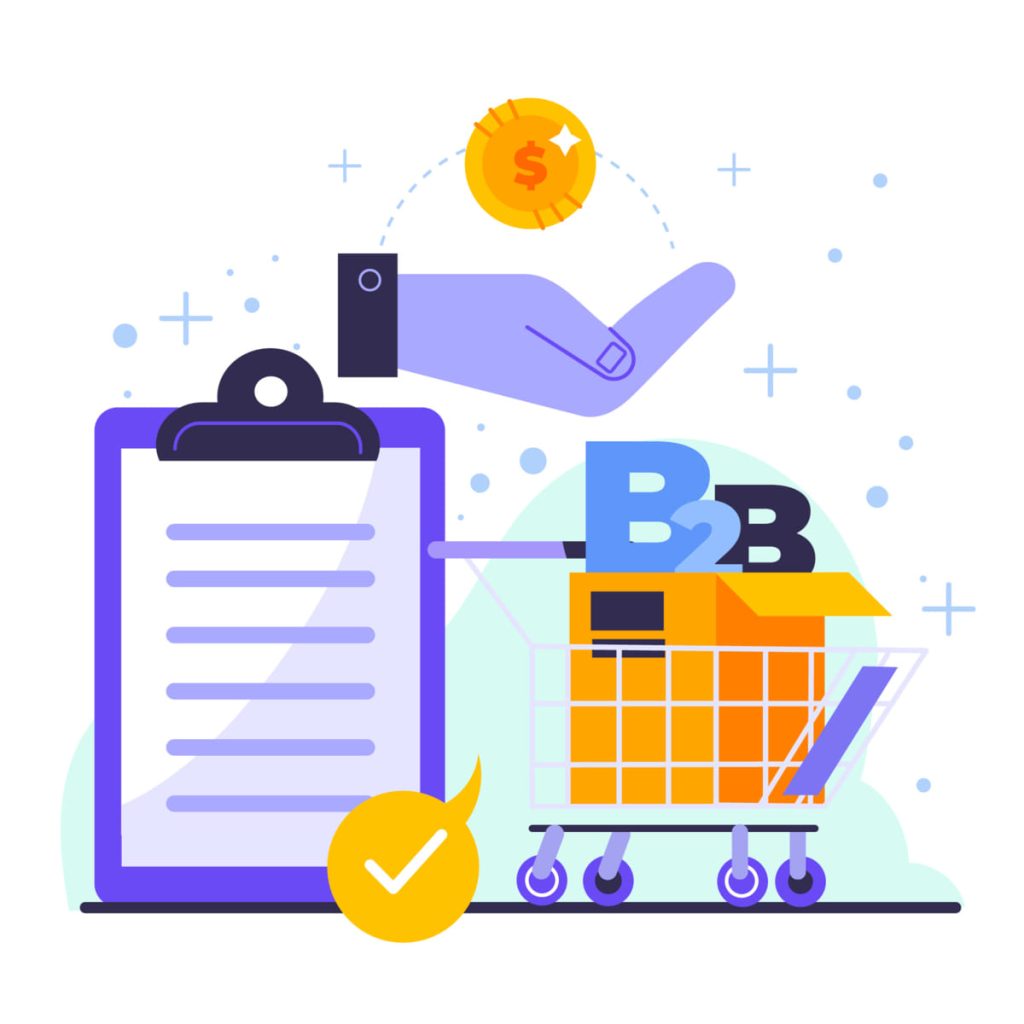Today, selling online isn’t just about businesses reaching out to individual shoppers. More and more, businesses are selling to other businesses. That’s where B2B e-commerce websites come into the picture. With the surge in this trend, there’s an escalating demand for B2B ecommerce website development services tailored for such specialized requirements.

Now, you might ponder, “Isn’t an online store just an online store?” Not exactly. A website designed for direct consumers, or B2C, operates distinctly from a B2B one. Let’s delve into the reasons:
First off, the purchasing behaviours of businesses contrast significantly with your average shopper. They may often place orders in bulk, or they might seek tailored pricing. Their buying processes can be intricate, involving several stages and approvals.
Secondly, B2B purchases are rarely made on a whim. A company will typically require extensive information before making a decision. Detailed product specifications, relevant case studies, and avenues for direct communication or inquiries are often at the top of their list.
Therefore, when contemplating the development of a B2B e-commerce site, it’s crucial to understand that it’s not merely a ‘standard’ online storefront with a different name tag. It demands unique tools, functionalities, and aesthetics. With the growing number of businesses taking their operations online, the need for these specific website features provided by B2B ecommerce website development services is only set to soar.
Tailored Pricing Structures
Every business that comes to you is different. Some might place big orders every month, while others only once in a blue moon. Some might have been buying from you for years, building trust and loyalty. It’s only fair that you treat them differently, right?
This is where your website can help. Just like you might give a longtime friend a special birthday present, your site should offer special prices for loyal or big-order clients.
Handling Big Orders
Now, let’s imagine you’re throwing a party. If you were buying soda, you wouldn’t pick up cans one by one; you’d grab a multi-pack or even a few! That’s how businesses shop, too. They’re not looking for one or two items; they’re often looking for hundreds or thousands. It should make placing big orders easy. Features like “quick reorder” can be a lifesaver for businesses that need to restock often. And offering price breaks for bigger quantities? That’s just the cherry on top.
Easy-to-Understand Product Information
When businesses shop, they need all the details. Think of a friend explaining a new gadget to you; they’ll tell you what it does, how to use it, and why they think it’s great. That’s how your product details should come across on your website. It’s not just about listing out technical specs, although they’re important.
You should also explain how the product is used and share stories or examples of others using it successfully. If you can, sprinkle in some real-life experiences or case studies. This way, potential buyers don’t just get a list of features; they see the bigger picture of what they’re investing in.
User-Friendly Search Tools
Let’s be real; no one likes to waste time hunting for stuff online, especially businesses with tight schedules. If you’ve ever been frustrated trying to find that one specific shirt in an online store with thousands of options, you’ll know the importance of a good search tool.
For B2B sites with tons of products, this is even more crucial. Your search bar shouldn’t just be a basic box. It needs filters to narrow things down, predictions to help guide the search and an option for those who know the exact product code. Make it as easy as possible for buyers to find exactly what they’re looking for quickly.
Multi-user Account Capabilities
You know how in an office, you’ve got the person who finds the product, gives it the thumbs up, and handles the money? Well, imagine they all need to use one online account. It would be super handy if they each had their own way to log in, right?
This is where multi-user capabilities come in. Think of it as giving different keys to different team members. One might be able to just add stuff to the cart, while another can approve it, and yet another can pay for it. It keeps things organized, and everybody knows what they’re supposed to do.
Making Friends with ERP Systems
Okay, let’s think about a juggler. If he’s just juggling balls, he’s okay. But what if we add in bowling pins, rings, and maybe a flaming torch? Things get complicated fast. That’s how e-commerce feels sometimes. You’ve got orders coming in, stock levels to keep track of, and customers you want to keep happy.
An ERP system, or let’s call it our ‘Super Juggler Assistant,’ helps keep everything in the air without dropping it. It connects your online store to other parts of your business, like the warehouse or the customer service desk. So when someone places an order, everyone knows what’s happening, and everything runs smoothly.
Mobile-Responsive Design
Have you ever tried browsing a website on your phone, only to get frustrated because the text was too tiny or the buttons weren’t working right? Yep, that’s what happens when a site isn’t mobile-friendly. Nowadays, many folks are doing business right from their phones or tablets. It’s not just about making calls or sending emails anymore; people are placing big orders and making decisions on the go.
So, if your B2B website doesn’t look or work well on mobile devices, you’re potentially losing out on a huge chunk of business. The key? Make sure your website adjusts smoothly, whether someone’s on a big computer screen, a handy tablet, or their trusty smartphone.
Enhanced Security Features
Now, onto the second biggie – security. Imagine a vault. If it’s got a shaky door and a rusty lock, would you trust it with your valuables? Probably not. In the digital world, a B2B website is kind of like that vault. Businesses are going to share sensitive information, like credit card details or company data. If your website’s security isn’t up to par, it’s like inviting trouble.
That’s why it’s super important to use strong security tools. Think of high-level encryption and multi-step logins. Always keep an eye out for new safety updates; the digital world changes fast, and you’ve got to keep up!
Educational Content and Resources
Let’s talk about knowledge sharing. Wouldn’t it be great if a brand not only sells you products but also guides you on how to use them best? That’s the power of educational content.
By putting out easy-to-understand blogs, simple “step-by-step” guides, or even short video tutorials, you’re showing your customers that you care about their success. It’s like saying, “Hey, we’re experts in what we do, and we’re here to help you out.” Over time, this can set you apart as a trusted voice in your industry.
Transparent Shipping and Logistics
Now, moving on to handling orders. The wait for your online product can be nerve-wracking, right? Now, amplify that feeling for businesses that might be ordering products in big quantities. They need to know when they’ll get their order, how it’s coming, and what to do if something isn’t quite right.
That’s why being upfront about shipping is crucial. Show real-time shipping updates, let them track their orders, and always be clear about returns. If there’s an issue, they should know how to sort it out without any fuss.
Efficient Customer Support
Let’s keep it simple: when someone needs help, they want options. That could be a chatbot for quick questions, a live chat with a real person for something more complex, an email for detailed inquiries, or a good old-fashioned phone call for a direct chat. It’s also a good idea to have a FAQ page. Consider the common questions folks might have and pop them out with clear answers.
Wrapping It Up: Dive Right into B2B E-commerce, But Do It Right
Stepping into B2B e-commerce is a bit different than just selling to everyday folks. Here, we’re talking to other businesses, and that means understanding what they need and want. Putting money and time into specialized ecommerce website development can really pay off. It’s like laying the right foundation for your house – it ensures everything that comes after is solid.
Think about all the features we’ve chatted about, especially if you want your website to be a hit with your business customers. The goal? Make your site the go-to place for them. Do it right, and you’ll not only make them happy but also see your own business grow and thrive.
Author Bio: –

Deepankar heads Magneto IT Solutions’ Canadian operations. He consults closely with clients to ensure that their company objectives are matched with their eCommerce and technology strategies, building long-term partnerships. He is an eCommerce Consultant and Digital Marketing expert with over 8+ years of experience in helping B2B, B2C, and D2C businesses innovate, evolve and thrive in markets all over the world.
